
Fisheries Science
Finding Ways to Feed the World in a Sustainable Manner
Fisheries play an essential role in the sustainability and health of our planet by providing much-needed food as well as other important services. Globally, fisheries feed billions of people and offer jobs and livelihoods for millions more. The global market value of marine and coastal resources and industries is estimated at three trillion dollars annually.[1] Over three billion people depend upon the oceans to provide their primary source of protein, and marine fisheries directly or indirectly employ over 200 million people.[2] In the United States alone, fishing generates over $200 billion in sales each year and more than 1.7 million jobs rely on commercial and recreational fisheries.[3] Other benefits, whether cultural, inspirational, or recreational, are harder to quantify but just as important.
There are four key concepts that are essential to fully understanding fisheries science and its role in managing the sustainability of the ocean’s limited resources:
What is a Fishery?
A fishery is a geographic area that is associated with a population of aquatic organisms (fish, mollusks, crustaceans, etc.) which are harvested for various economic endeavors.[4] Generally, a fishery exists for the purpose of providing human food, although other purposes are possible, such as sport or recreational fishing, obtaining ornamental fish, or producing fish products (fish oil, cosmetics, paint, lubricants, soaps, industrial coatings). Industrial fisheries are fisheries where the catch is not intended for direct human consumption.[5]
What is a Fish Stock?
Fish stock is the living resources in the community or population from which catches are taken in a fishery. The use of the term fish stock usually implies that the particular population is more or less isolated from other stocks of the same species and, therefore, self-sustaining.[6] However, fish stocks are not necessarily the same as fish populations. A population is a group of fish of the same species, but a fish stock can be a population, a smaller subset of one population, or can include more than one population. Fish stocks are often identified by management areas, which are defined geographical regions. They are typically fish of the same species, although individual fish in different stocks might mix or migrate between different areas.[7]
When assessing a fish stock, fisheries scientists estimate how many fish are in a management area in a given period, as well as the expected impacts and benefits of proposed fisheries management measures for that stock. Information from stock assessments helps fisheries scientists make decisions about rules or directions to follow for specific management areas or fisheries.[8]
What is Overfishing?
Overfishing occurs when vessels catch fish faster than fish stocks can replenish because the breeding population becomes too depleted to recover. Due to overfishing, fish populations are in an alarming decline across the globe. Recent studies have shown that approximately 90% of the biggest fish in the world’s oceans have been taken by big commercial fishing fleets.[9] Prolonged overfishing has caused nearly a third of the world’s assessed fisheries to be fished far beyond their sustainable capacity.
Ocean Sustainability
Ocean sustainability is about approaching ocean management in a way that protects the ocean and the resources it provides.[10] It is, in short, a balancing act between what is good for the health and well-being of the ocean and what is good for the economic well-being of those who are dependent on the ocean. Ocean sustainability requires the “use of ocean resources in ways that preserve the health and resilience of marine ecosystems and improves livelihoods and jobs, balancing protection and prosperity.”[11] Obviously, the overfishing of fish stocks is one of the primary threats to ocean sustainability (along with climate change, ocean acidification and pollution, plastic or otherwise).
In 2015, the United Nations adopted the Sustainable Development Goals. The adoption of the 17 Sustainable Development Goals was a universal call to action to end poverty, protect the planet, and ensure that by 2030 all people enjoy peace and prosperity. Sustainable Development Goal 14 is “Conserve and sustainably use the oceans, seas and marine resources” or, more colloquially, “Life Under Water.” Out of the ten specific target set forth in Goal 14, four directly to involve fisheries issues:
14.4 Fish stocks within sustainable levels. By 2020, effectively regulate harvesting and end overfishing, illegal, unreported and unregulated fishing and destructive fishing practices and implement science-based management plans, in order to restore fish stocks in the shortest time feasible, at least to levels that can produce maximum sustainable yield as determined by their biological characteristics.
14.6 Combat Illegal, Unreported and Unregulated Fishing. By 2020, prohibit certain forms of fisheries subsidies which contribute to overcapacity and overfishing, eliminate subsidies that contribute to illegal, unreported and unregulated fishing and refrain from introducing new such subsidies, recognizing that appropriate and effective special and differential treatment for developing and least developed countries should be an integral part of the World Trade Organization fisheries subsidies negotiation
14.7 Income from Sustainable Fisheries. By 2030, increase the economic benefits to Small Island developing States and least developed countries from the sustainable use of marine resources, including through sustainable management of fisheries, aquaculture and tourism
But the most recent Sustainable Development Goals Report, released in July 2022, states that “cascading and interlinked crises are putting the 2030 Agenda for Sustainable Development in grave danger, along with humanity’s very own survival.” The Report highlights that the “rapidly growing consumption of fish (an increase of 122 per cent between 1990 and 2018), along with inadequate public policies for managing the sector, have led to depleting fish stocks.”[12]
Fisheries Science
Managing fisheries sustainably is an adaptive process that relies on sound science and that starts with accurate scientific information about fish and fisheries.[13] Fisheries scientists focus on managing the biology, ecology, and oceanography of the nation’s living marine resources (fish, shellfish, crustaceans, and marine mammals) and their habitat. In conducting their work, fisheries scientist bring together a wide range of academic disciplines, including ecology, mathematics and statistics, population dynamics, and marine biology, all with the aim of better understanding fish stocks and fisheries so that they can be sustainably managed.[14] Fisheries scientists analyze the ecological health and sustainability of fisheries, how the health of fisheries affects the people who interact with them and vice versa. Fisheries scientists assess and monitor fish and aquatic invertebrate populations to determine ecological and economic health of the environment as well as to determine harvest rates of various species.[15]
…
Citations
- Life Below Water, United Nations Sustainable Development Goals.
- Life Below Water, United Nations Sustainable Development Goals.
- Fisheries Economics of the United States, National Oceanographic and Atmospheric Administration.
- What are Fisheries?, National Oceanographic and Atmospheric Administration.
- Fishery, New World Encyclopedia.
- Fish Stock, European Environment Agency.
- Fisheries Science Overview, Government of Canada.
- Fisheries Science Overview, Government of Canada.
- What are Fisheries?, National Oceanographic and Atmospheric Administration.
- World Ocean Day: What is ocean sustainability?
- Integrated Ocean Management Blue Paper 14, Winther, J. G. et al., World Resources Institute, (2020).
- The Sustainable Development Goals Report 2022, United Nations.
- Sustainable Fisheries: Science, National Oceanographic and Atmospheric Administration.
- Fisheries Science Overview, Government of Canada.
- What is fisheries science?, Hutton Junior Fisheries Biology Program.

The Path to Becoming a Fisheries Scientist
From High School to Your First Job
Build a Solid Academic Foundation
Basics:
Take all available STEM-related courses (biology, physics, chemistry, computer science, mathematics) offered at your high school. Take all these classes at the most advanced level possible (honors, AP). This will help you to learn to think critically, problem-solve, and build your knowledge base.
Recommended:
If not available at your high school, try and take biology-related (marine biology, microbiology, fish genetics, fish physiology, ecology), aquaculture or fisheries science-related, environmental science-related, and aquatic science-related (hydrology, limnology, oceanography) classes offered online.
Keep in Mind:
Try and get work experience through a research internship, summer program, or a job. Learn how to write for a technical and non-technical audience. You will need a strong background in mathematics and statistics. Spend time learning the basics, and the more complex concepts will follow naturally.
Dive In!
And become an expert
![]()
Peruse our library of must-read books
![]()
Thumb through a scientific publication
Take an online course
![]()
Watch an interesting video
![]()
Check out these great websites
Get a

jump on your Academic career
There’s no substitute for experience.
We have compiled a database of thousands of internships, research opportunities, academic programs and specialized training programs so you can get a jump on your academic career.
Internships
Research
Academic Training Programs
And if you need support to fulfill your dreams and ambitions, our searchable database has plenty of scholarship opportunities as well as programs designed to increase diversity in the sciences.
Scholarships
Diversity, Equity & Inclusion
Need Help Finding Your Opportunity?
Our video tutorials explain the ins and outs of landing a great internship, research project or training program.
Make all the right moves
Advice from those who know
Maintain an excellent GPA, especially in the sciences
Have some work experience on your resume
Attend professional conferences and fisheries science seminars
Take business courses
Present your research at student research colloquiums
Build experience through internships or as an undergraduate researcher
Join professional societies and organizations
Stay current by reading professional and scientific journals
Learn about current research projects
What degree is right for you?

Bachelor’s Degree
A bachelor’s degree is the minimum requirement to work in the field of fisheries science. If you do not attend a school with a specific fisheries science major, you should obtain a degree in a constituent area (ichthyology, marine biology, physiology, zoology) and add coursework in hydrology, limnology, and oceanography. Familiarity with fieldwork techniques and the use of scientific instrumentation is essential.
Master’s Degree
A master’s degree is recommended as this is where you will be able to specialize your studies in fisheries science. Obtaining your master’s degree will also result in better employment opportunities at the state and federal level as well as in the private sector. If your undergraduate degree was not specifically in fisheries science, then a master’s degree (aquaculture or fisheries) may be required to obtain a better position as well as for future advancement.
Doctoral Degree
A doctoral degree and, most likely, post-doctoral studies are required if you want to have a career in academia. Senior-level positions in state (fish and wildlife departments) and federal government agencies (U.S. Department of Agriculture, National Oceanic and Atmospheric Administration) and executive-level positions in the private sector (pharmaceuticals, industrial fisheries, biotechnology firms, private research institutions, consulting firms) may also require that you have your doctoral degree.
10 Schools With Excellent Fisheries Science Programs
Want to see the full list of colleges and universities with degree offerings or relevant courses?
Aquatic and Fishery Sciences
University of Washington
Fisheries and Marine Sciences
University of Alaska Fairbanks
Fisheries Science
University of Idaho
Fisheries and Wildlife Sciences (Minor)
Oregon State University
Fisheries (Minor)
University of Maine
Fisheries and Aquatic Science
University of Wisconsin-Stevens Point
Wildlife and Fisheries Science
Pennsylvania State University
Aquatic Sciences: Fisheries Concentration
Purdue University
Aquaculture and Fisheries Science
University of Rhode Island
Fisheries and Aquatic Sciences
University of Florida
![]()
Tip 1
Find a program that includes technical training and experience, including outdoor research and hands-on learning with aquatic animals. This can help develop professional skills and make you a competitive candidate for a job.
![]()
Tip 2
Choosing a scientific specialty early on in your career can help you gain relevant work experience and skills in the right field. When choosing your specialty, consider your educational background and personal interests.
![]()
Tip 3
Employers typically look for fisheries scientists with relevant professional experience. To get started in the field, find an internship, summer job, or entry-level position that involves working with fish or other aquatic animals.
Have familiarity with one or more of the following areas
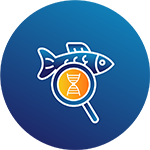
Scientific Methodology
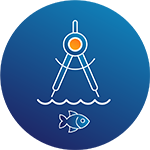
Mathematics
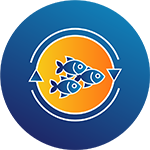
Conservation Biology
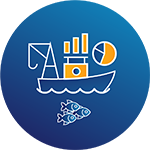
Statistics
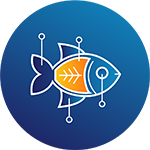
Fish Biology

Fish Identification

Aquaculture
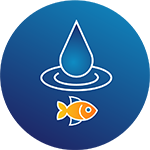
Fish Ecology
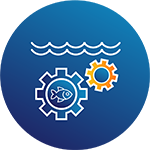
Ecosystem Management
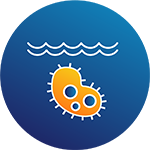
Aquatic Organisms
Typical Job Functions of a Fisheries Scientist
Here are some of the interesting things you could be doing.
Developing comprehensive management plans for habitat restoration.
Counting and tracking fish stocks or populations.
Collect data and biological samples from fish and invertebrates.
Studying how aquatic life interacts with its habitat.
Protecting aquatic habitats from invasive species.
Evaluating environmental contaminants.
Determining sustainable fishing or harvest rates.
Conducting studies of fish population for survival, growth, and migration.
Participating in fish sampling using a variety of sampling gears and techniques.
Identifying marine fish and invertebrates to species.
There’s an Ocean of Possibilities
A career in fisheries science requires an interest in fisheries, fishing operations, fish and their natural environments. Career opportunities are varied, including science-oriented careers focused on understanding fish and aquatic ecology, managing fish resources for public agencies, and fish production and utilization for sale by private industry. Some potential fisheries careers include research support for field or laboratory studies, hatchery or aquaculture production, and management or conservation of aquatic resources. If you are comfortable handling fish and shellfish and enjoy conducting research both outdoors and in a lab, then fisheries science may be the career for you.
Common jobs include:
- Aquaculturist
- Aquatic Biologist
- Biological Technician
- Conservation Officer
- Customs Inspector
- Environmental Educator
- Environmental Specialist
- Fish Culturist
- Fish Hatchery Manager
- Fish and Game Warden
- Fish and Wildlife Assistant
- Fish and Wildlife Scientific Aide
- Fisheries Biologist
- Fisheries Ecologist
- Fisheries Technician
- Habitat Restoration Specialist
- Marine Biologist
- Marine Extension Agent
- Research Biologist
- Reservoir Manager
- Special Agent
- Wastewater Treatment Analyst
- Water Quality Advisor
- Watershed Restoration Specialist
- Zookeeper
Common employers include:
Federal
- Army Corps of Engineers
- Bureau of Reclamation
- Bureau of Land Management
- Bureau of Indian Affairs
- Environmental Protection Agency
- Fish and Wildlife Services
- Forest Services
- Marine Advisory Extension Services
- National Marine Fisheries Services
- National Oceanic and Atmospheric Administration (NOAA)
- National Park Services
- Natural Resources Conservation Services
- Peace Corps
- Smithsonian Institute
- U.S. Customs Services
- USDA Wildlife Service
- Federal Power Administration
- U.S. Geological Survey
State
- Fish and Game Departments
- Parks and Recreation Departments
- Water Resource Departments
- Water Resource Control Boards
- Public Aquariums
Private
- Aquaculture and Mariculture Companies
- Aquarium and Pet Supply Companies
- Environmental Consultants
- Manufacturing Companies
- Public Utilities
- Timber Product Companies
- Water Quality Monitoring Equipment
International
- Food and Agricultural Organizations of the United Nations (FAO)
- United Nations Development Program (UNDP)
- Inter-American Tropical Tuna Commission
Start your career search with our extensive list of employment websites.
